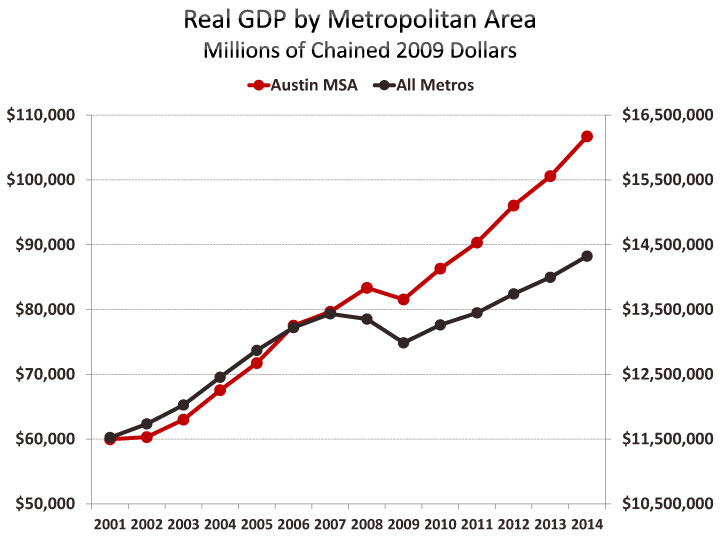For the first several months of 2009, Austin was alone among major metros in continuing to see positive year-over-year job growth. That streak ended when revised May numbers were released by the Texas Workforce Commission. The initial release of July estimates shows that our losses since July 2008 are a relatively moderate -0.2%, meaning our “best performing” position continues to hold in our major metros ranking based on percent change in nonfarm payroll jobs.
Houston’s 3.1% job loss rate has put it at 18th in this ranking for July, but Dallas, Fort Worth, and San Antonio continue to place in the top 10.
If this ranking was expanded to the 100 largest metros, instead of the 50 largest, there would only be three metros outperforming Austin. Two of those metros added jobs over the last 12 months: El Paso (0.9%) and Baton Rouge (0.2%). The median rate of loss among the 50 largest metros is -4.1%. Nationally, the difference between July 2008 and July 2009 is -4.2%, and for Texas it is -2.1%. Eleven states outperform Texas on job growth.
New York is the best performing large state with job losses amounting to only -1.9% and three divisions of the New York MSA also make the best performing metros top 10 list. California’s losses (-5.0%) put it at 43rd and the state’s large metros have seen losses ranging from -4.2% to -6.0%. Two of California’s metros, Sacramento and Riverside, fall into the bottom quintile of the 50 largest metros. The very bottom of the ranking includes Detroit and Warren, with well known job market issues, but also Phoenix and Las Vegas, metros that, previous to this recession, had been among the fastest growing.
When we looked at the data for Austin and other Texas metros last week in @theChamber after the TWC release of this data, two sectors set Austin apart. Austin saw growth in private service providing jobs (3,200 jobs or 0.6%), where the other large Texas metros saw losses; and in goods producing industries, Austin’s losses (10,000 jobs or 9.4%) were more dramatic than those seen elsewhere.Breaking out private service providing employment for the nation’s top 50 metros also shows Austin to be the only metro with positive job growth. For goods producing industries (manufacturing, construction and natural resources), Austin’s -9.4% change would rank as the 18th best. In the top 10 performing metros nationally, only Washington saw a decline in goods producing jobs as large as Austin’s, however that metro is considerably less concentrated in goods producing industries than Austin and other metros. The dominant sector buoying Austin’s performance is continued growth in government jobs (5,400 or 3.5%). Other Texas metros and the nation generally are seeing those jobs grow, however Austin benefits from the relative share that the sector represents here. Among the top 10 performing metros, only Washington and Virginia Beach also have a government sector accounting for more than 20% of total employment. The average government share in the other top performing metros is about 15%.
by Beverly Kerr, Chamber Vice President of Research




